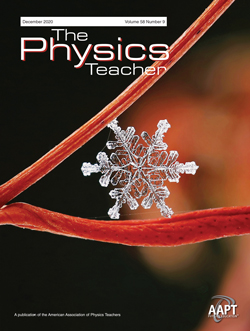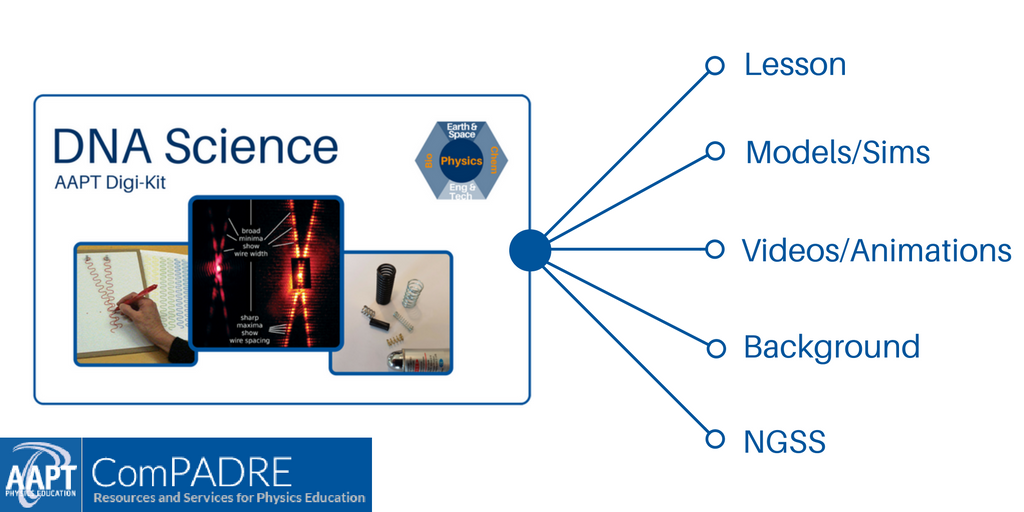The Physics Teacher
Volume 58 Issue 9
December 2020
This month's cover is another astonishing photograph by Daniela Rapava, a delicate snowflake occupying an improbable perch. Dr. Rapava’s work has been featured on TPT covers and in Visual Physics in the past—see TPT issues from Nov. 2018, Dec. 2016, Oct. 2016, May 2015, and April 2015.using a Nikon D3200 digital camera equipped with a micro lens f=105 mm.
Since August 1, 2014, the submission process for articles for The Physics Teacher has required authors to submit their article and cover letter at this website: http:www.editorialexpress.com/tpt. Starting June 10, 2020, the submission process for articles for The Physics Teacher will change. On or after June 10th, authors should submit their article and cover letter at this website: http://tpt.peerx-press.org/.
Columns
And the Survey Says..., Astronotes, Figuring Physics, iPhysicsLabs, Little Gems, Physics Challenge for Teachers and Students, Fermi Questions, Talkin' Physics, Technology In The Classroom, Visual Physics, and Websights.
LETTERS TO THE EDITOR
Collisions involving vibration by Rod Cross. DOI:10.1119/10.0002721
Papers
The Hydrostatic Paradox Redux by Thomas B. Greenslade Jr. DOI: 10.1119/10.0002723
Tradition Meets Technology: Acoustical Analysis of a Kazakh Dombra with Smartphones by Lutz Kasper and Patrik Vogt. DOI: 10.1119/10.0002724
Where Do Women of Color Complete Physics Degrees? by Angela Johnson, Rose Young and Elizabeth Mulvey. DOI: 10.1119/10.0002725
Is My Physics Textbook Sexist? by Katemari Rosa and Maria Ruthe Gomes da Silva. DOI: 10.1119/10.0002726
Using a Simple Pendulum Investigation to Develop Students’ History and Nature of Science Knowledge by Isaiah Kent-Schneider and Jerrid Kruse. DOI: 10.1119/10.0002727
A Ballistic Pendulum with Varied Launch Speed by James C. Sanders. DOI: 10.1119/10.0002728
Exploration of Large Pendulum Oscillations and Damping Using a Smartphone by Dean Li, Lilan Liu and Shaona Zhou. DOI: 10.1119/10.0002729
Momentum Vector Diagrams by Trai Unyapoti, Kwan Arayathanitkul and Narumon Emarat. DOI: 10.1119/10.0002730
Magnetic Force from Terminal Velocity by Michele D’Anna and Tommaso Corridoni. DOI: 10.1119/10.0002731
Interference and Diffraction in Modern Technology: A New Approach for an Introductory Physics Laboratory Experiment by Kristin Rabosky, Colin Inglefield and Kiley Spirito. DOI: 10.1119/10.0002732
Pseudo-Double-Slit Experiment with Two Glass Plates by Chang-won Kang, Hyen-Jung Nam and Jung Bog Kim. DOI: 10.1119/10.0002733
Measuring Wavelengths with LEGO® Bricks: Building a Michelson Interferometer for Quantitative Experiments by Nils Haverkamp, Christoph Holz, Malte Ubben and Alexander Pusch. DOI: 10.1119/10.0002734
Yo-Yo Jerk Dynamics in the Vicinity of the Lowest Point by Leonid Minkin and Daniel Sikes. DOI: 10.1119/10.0002735
Connecting Torque and Friction Using Tactile Learning Activities by Padma Ganesh. DOI: 10.1119/10.0002736
Arduino-Smartphone Device as a Physical Phenomena Measurer by Sylvana Varela Ballesta, Raúl Saez, Jordi Iglesias and Anton Vernet. DOI: 10.1119/10.0002737
Solving More ‘Calculus-Based’ Physics Problems with Trigonometry by Dave Baum. DOI: /10.1119/10.0002738
Development of an Augmented Reality-Based Game for Projectile Motion by Milan Chandrakar and Kaushal Kumar Bhagat. DOI: 10.1119/10.0002739
Flipped Classes: An Opportunity for Low-Stakes Group Problem Solving by G. E. Matthews and Jack Dostal. DOI: 10.1119/10.0002740
Schools on Different Corners: An Investigation into the Effects of Ethnicity and Socioeconomic Status on Physics Offerings in Northern California Public High Schools by David Marasco and Bree Barnett Dreyfuss. DOI: 10.1119/10.0002741
Race and Physics Teaching Collection Resource
DNA Science Lesson & Digi-Kit
Inspired by an article from The Physics Teacher, this multidisciplinary lesson and digital resource collection is based on How Rosalind Franklin Discovered the Helical Structure of DNA: Experiments in Diffraction (Braun, Tierney, & Schmitzer, 2011). Click the image to access this resource.



